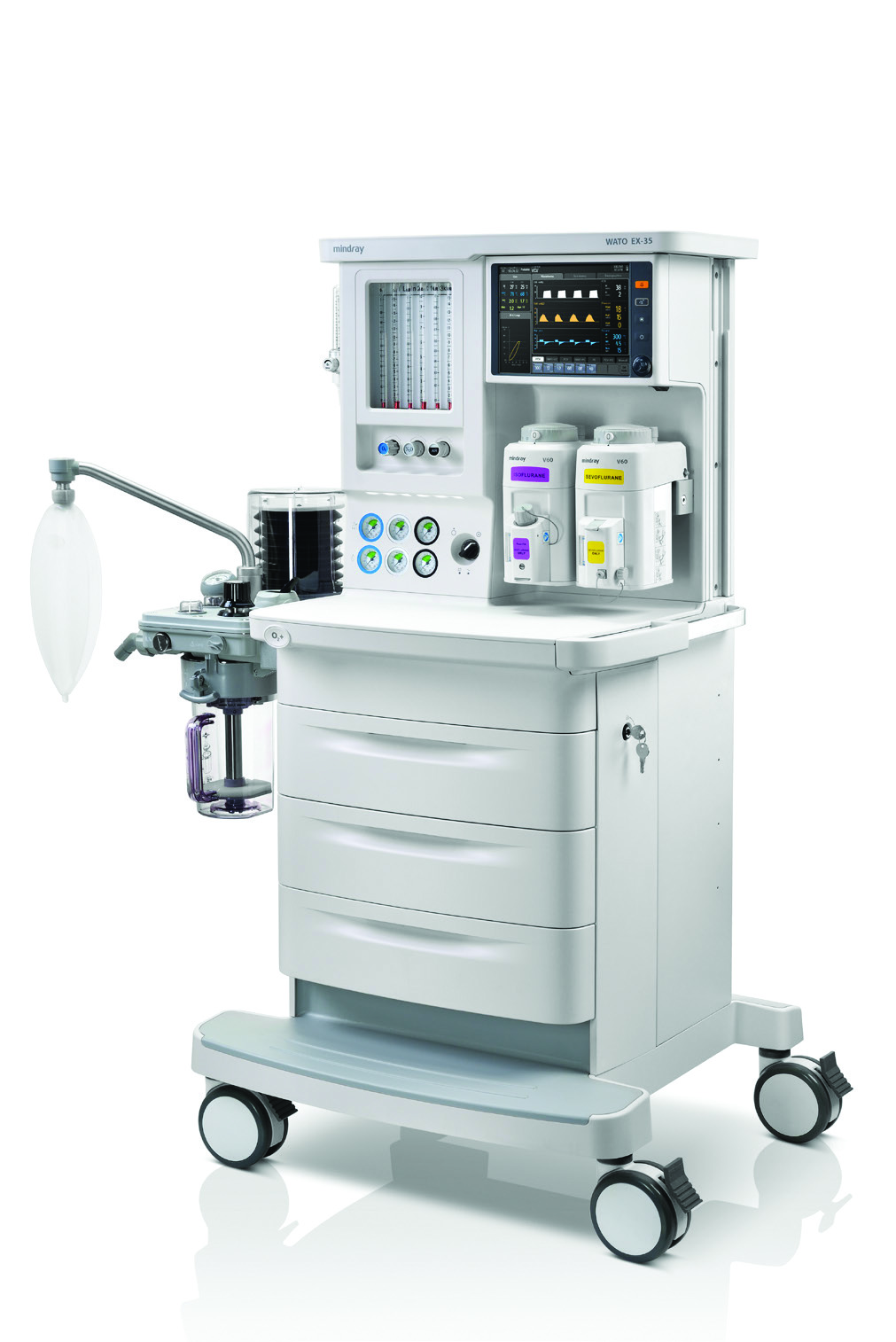Mindray WATO EX-35 anaesthetic and breathing apparatus
The anaesthesia machine is designed to provide general inhalation anaesthesia and and assisted breathing for a wide variety of patients. Actual equipment, modules and functions depend on the configuration selected.
Free shipping
Guarantee
Features
- Volume Controlled Ventilation (VCV) is a fully mechanical ventilation mode. In VCV mode, each time mechanical ventilation is started, gas is delivered to the patient in a constant flow that reaches a predefined value of Vt during the gas delivery time.
- Pressure Controlled Ventilation (PCV) mode is the primary mode of all-mechanical ventilation. Each time mechanical ventilation is started in PCV mode, Paw increases rapidly to a predefined Pinsp value. The tidal volume delivered in PCV mode varies depending on the patient's lung capacity and airway resistance.
- This anaesthesia machine supports two SIMV modes: Synchronised Intermittent Volume Controlled (SIMV-VC) and Synchronised Intermittent Pressure Controlled (SIMV-PC).
- SIMV-VC is a mode that provides volume-controlled ventilation to a patient in stages at predefined intervals. In SIMV-VC mode, the ventilator waits for the patient's next breath based on a predefined time interval.
- SIMV-PC is a mode in which pressure-controlled ventilation is delivered to the patient in stages at predefined intervals. In SIMV-PC mode, the ventilator waits for the patient's next breath based on a predefined time interval.
- Measurement of O2 by the paramagnetic method.
- Automatic shutdown of the N2O supply in case of low O2 supply pressure.
- Modular design of the device.
- Automatic leak detection.
- Timer for counting the time between the start and end of the operation.
- Can be connected as an external device to a patient monitor that meets the requirements of the relevant international standards.
Characteristics
- Patient type: Adults, children and newborns (from 3 kg)
- Operating modes: automatic, manual
- Ventilation modes: mechanical, VCV, PCV, pressure-supported ventilation, SIMV-VC, SIMV-PC
- Display.: 10.4 inches, touchscreen
- Respiratory volume: 20-1500 ml
- P(limit): 10 to 100 cm H2O
- ΔPsupp: from 3 to 60 cm H2O
- P(insp): 5 to 60 cm H2O
- I:E: from 4:1 to 1:8
- Respiratory rate: 4 to 100 breaths/min
- Flow trigger: 0.5 to 15 l/min
- P-Trig: from -20 cm H2O to -1 cm H2O
- Tinsp: from 0.2 to 5 s
- Working gases: O2, N2O (optional), Air
- Operating gas pressure: from 280 to 600 kPa
- Battery life: 90 minutes on one battery or 240 minutes on two batteries (second battery optional)
- Module AG: Optional
- CO2 module: Optional
- Auxiliary electrical sockets: Optional
- Attaching the patient monitor to the device: Optional
- Overall dimensions: 1410×780×690 mm (height × width × depth) (without breathing circuit)
- Features
- Characteristics
- Volume Controlled Ventilation (VCV) is a fully mechanical ventilation mode. In VCV mode, each time mechanical ventilation is started, gas is delivered to the patient in a constant flow that reaches a predefined value of Vt during the gas delivery time.
- Pressure Controlled Ventilation (PCV) mode is the primary mode of all-mechanical ventilation. Each time mechanical ventilation is started in PCV mode, Paw increases rapidly to a predefined Pinsp value. The tidal volume delivered in PCV mode varies depending on the patient's lung capacity and airway resistance.
- This anaesthesia machine supports two SIMV modes: Synchronised Intermittent Volume Controlled (SIMV-VC) and Synchronised Intermittent Pressure Controlled (SIMV-PC).
- SIMV-VC is a mode that provides volume-controlled ventilation to a patient in stages at predefined intervals. In SIMV-VC mode, the ventilator waits for the patient's next breath based on a predefined time interval.
- SIMV-PC is a mode in which pressure-controlled ventilation is delivered to the patient in stages at predefined intervals. In SIMV-PC mode, the ventilator waits for the patient's next breath based on a predefined time interval.
- Measurement of O2 by the paramagnetic method.
- Automatic shutdown of the N2O supply in case of low O2 supply pressure.
- Modular design of the device.
- Automatic leak detection.
- Timer for counting the time between the start and end of the operation.
- Can be connected as an external device to a patient monitor that meets the requirements of the relevant international standards.
- Patient type: Adults, children and newborns (from 3 kg)
- Operating modes: automatic, manual
- Ventilation modes: mechanical, VCV, PCV, pressure-supported ventilation, SIMV-VC, SIMV-PC
- Display.: 10.4 inches, touchscreen
- Respiratory volume: 20-1500 ml
- P(limit): 10 to 100 cm H2O
- ΔPsupp: from 3 to 60 cm H2O
- P(insp): 5 to 60 cm H2O
- I:E: from 4:1 to 1:8
- Respiratory rate: 4 to 100 breaths/min
- Flow trigger: 0.5 to 15 l/min
- P-Trig: from -20 cm H2O to -1 cm H2O
- Tinsp: from 0.2 to 5 s
- Working gases: O2, N2O (optional), Air
- Operating gas pressure: from 280 to 600 kPa
- Battery life: 90 minutes on one battery or 240 minutes on two batteries (second battery optional)
- Module AG: Optional
- CO2 module: Optional
- Auxiliary electrical sockets: Optional
- Attaching the patient monitor to the device: Optional
- Overall dimensions: 1410×780×690 mm (height × width × depth) (without breathing circuit)


